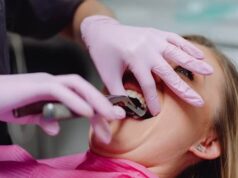Are your teeth crowded or overly spaced out? Are you ashamed of letting your teeth show in public because they are not well positioned? Do you find it difficult to chew food because your teeth are out of alignment? What you need is orthodontic treatment. But before you schedule an appointment with your orthodontist, there are a few things you must know about the treatment.
What is Orthodontic Treatment?
Orthodontic treatments involve the use of appliances known as orthodontic appliances to correct teeth that are not in the proper position. These appliances can come in the form of fixed or removable orthodontic appliances, and are fitted in the mouth to correct the malocclusion.
Orthodontics is a dental subspecialty that seeks to correct malocclusion. An orthodontist is a specialist that carries out orthodontic treatment.
What Are the Things to Consider Before Going for Orthodontic Treatment?
The thought of having an orthodontic treatment can be quite exciting. But before you schedule an appointment with an orthodontist, there are certain things you should be aware of. Let’s discuss them right away.
1. You Must Complete Other Dental Treatments
Before an orthodontist will start fixing any appliance on your teeth to correct any misalignment, you must have completed any pending dental treatment. For example, if you have tooth decay, you will need to fix it before the appointment with your orthodontist.
Other treatments like extracting a bad tooth, root canal treatment, periodontal treatment and oral and maxillofacial surgeries such as cleft lip or cleft palate closure must be completed before orthodontic treatment. Adequate time should be allowed for healing to take place in cases of surgery before commencing orthodontic interventions.
Above all, nearly every orthodontic patient will need to do scaling and polishing before an orthodontic procedure. This helps to remove plaque, calculus and stain that can compromise treatment.
2. Removal of Two or More Teeth May Be Necessary
If your teeth are so closely packed together to the extent that some teeth are overlapping others, then the teeth will need to be spaced using braces. In cases where there is no space or the available space is not enough, it may lead to removal of two or more premolars. This is because the orthodontist needs to create space to unravel the crowding.
Your orthodontist will inform you if your case will require extraction of certain teeth.
3. You Should Be Willing to Wear an Orthodontic Appliance
Orthodontic treatment involves moving the teeth by applying minimal force. That is the role of orthodontic appliances. So, if you desire to properly align your teeth, you must be willing to wear an orthodontic appliance.
There are different appliances for different cases. Depending on your case, your orthodontist will decide if a removable or fixed appliance will be the best for you when you attend your appointment.
Initially, the appliance may affect speech, which will normalise after some time of wearing the appliance, usually 24 hours to 72 hours.
4. You May Experience Discomfort
After fitting an orthodontic appliance, you may experience discomfort and pain. The pain is usually mild to moderate and resolves within the first week. This is common with fixed appliances like braces.
Pain is usually due to the forces exerted by the braces on the teeth to move them into their right positions. This experience varies from individual to individual. Use over-the-counter analgesic to relieve pain
You may also experience sores in the mouth which usually resolves within the first week. There have also been cases of wire poking. This usually occurs if the end of an arch wire is touching the gum or buccal mucosa. If you experience this, visit your orthodontist to adjust the wire.
5. Willingness to Keep Appointments
Fixing braces requires frequent follow up visits in a year. If you want to wear braces, you must be willing to keep your appointment with the orthodontist every 4 to 6 weeks. Sometimes the frequent visits may become cumbersome, especially if you are coming from another state. That is why it is advisable you choose an orthodontics clinic close to you.
It is not advisable to start orthodontic treatment when you want to travel or be away for a long period of time.
Failure to keep to your appointment will prolong treatment as your orthodontist will not be able to make the necessary adjustments to achieve treatment goal.
6. You Must Be Ready to Maintain Good Oral Hygiene
The importance of good oral hygiene cannot be overemphasised when wearing braces or other orthodontic appliances. Poor oral hygiene can hamper treatment and elongate treatment time.
If you allow plaque and calculus to accumulate on your teeth while on braces, they can lead to cavities, swollen gums or even halitosis.
According to the American Association of Orthodontics, if you are wearing braces, you should brush after every meal for two minutes and before going to bed. Brush with a soft bristled toothbrush and fluoridated toothpaste. You should also floss at least once a day.
After setting up your braces, your orthodontist will give you instructions which will include the date of your next appointment. It is essential you keep those instructions to the letter. Failure to observe any of the instructions could result in prolonged treatment time.
Some of these instructions include eating soft diet, avoiding candy and gums as they can dislodge your brackets, brushing with soft toothbrush after every meal
7. Treatment can span up to 2 years
Braces require time for the desired corrections to happen. Depending on the severity of the malocclusion, the duration for wearing braces may vary from one person to another. However, generally, treatment can last between one year to two years.
In some cases, it may take more than two years to achieve treatment. This may occur if patients are not obeying the instructions and keep breaking their brackets. At other times, it could be that the patient is not keeping to their orthodontic appointment.
Conclusion
Orthodontic treatment is a beautiful thing. If you are planning fixing an appointment with your orthodontist, I believe that the above tips will help prepare your mind and also help you know what to expect during the treatment.









